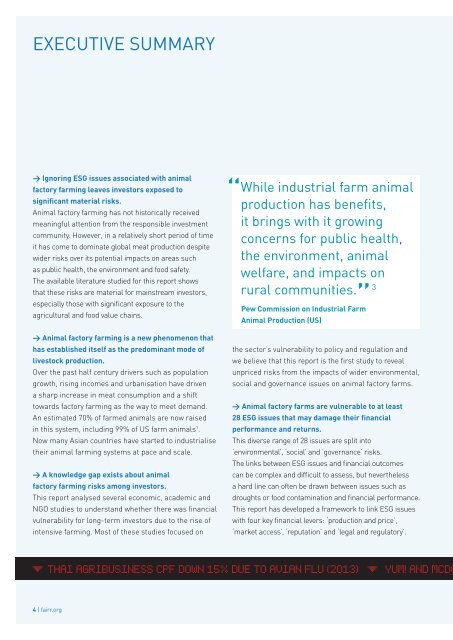FACTORY FARMING
1M2uJRn
1M2uJRn
Create successful ePaper yourself
Turn your PDF publications into a flip-book with our unique Google optimized e-Paper software.
EXECUTIVE SUMMARY<br />
> Ignoring ESG issues associated with animal<br />
factory farming leaves investors exposed to<br />
significant material risks.<br />
Animal factory farming has not historically received<br />
meaningful attention from the responsible investment<br />
community. However, in a relatively short period of time<br />
it has come to dominate global meat production despite<br />
wider risks over its potential impacts on areas such<br />
as public health, the environment and food safety.<br />
The available literature studied for this report shows<br />
that these risks are material for mainstream investors,<br />
especially those with significant exposure to the<br />
agricultural and food value chains.<br />
> Animal factory farming is a new phenomenon that<br />
has established itself as the predominant mode of<br />
livestock production.<br />
Over the past half century drivers such as population<br />
growth, rising incomes and urbanisation have driven<br />
a sharp increase in meat consumption and a shift<br />
towards factory farming as the way to meet demand.<br />
An estimated 70% of farmed animals are now raised<br />
in this system, including 99% of US farm animals 1 .<br />
Now many Asian countries have started to industrialise<br />
their animal farming systems at pace and scale.<br />
> A knowledge gap exists about animal<br />
factory farming risks among investors.<br />
This report analysed several economic, academic and<br />
NGO studies to understand whether there was financial<br />
vulnerability for long-term investors due to the rise of<br />
intensive farming. Most of these studies focused on<br />
While industrial farm animal<br />
production has benefits,<br />
it brings with it growing<br />
concerns for public health,<br />
the environment, animal<br />
welfare, and impacts on<br />
rural communities. 3<br />
Pew Commission on Industrial Farm<br />
Animal Production (US)<br />
the sector’s vulnerability to policy and regulation and<br />
we believe that this report is the first study to reveal<br />
unpriced risks from the impacts of wider environmental,<br />
social and governance issues on animal factory farms.<br />
> Animal factory farms are vulnerable to at least<br />
28 ESG issues that may damage their financial<br />
performance and returns.<br />
This diverse range of 28 issues are split into<br />
‘environmental’, ‘social’ and ‘governance’ risks.<br />
The links between ESG issues and financial outcomes<br />
can be complex and difficult to assess, but nevertheless<br />
a hard line can often be drawn between issues such as<br />
droughts or food contamination and financial performance.<br />
This report has developed a framework to link ESG issues<br />
with four key financial levers: ‘production and price’,<br />
‘market access’, ‘reputation’ and ‘legal and regulatory’.<br />
The key risks are:<br />
••<br />
Environmental – These are the most quantifiable<br />
of the three (ESG) areas and include issues such as<br />
climate change, water scarcity and water pollution.<br />
For the latter the example of North Carolina is cited,<br />
which permanently banned new pig factory farms in<br />
2007 to protect water courses and prevent pollution.<br />
Reports indicate that if the industry was forced to<br />
meet the costs of its pollution, this could equate to<br />
billions of dollars 2 . The chapter also cites the large<br />
contribution of the livestock sector to climate change<br />
(14.5% of all man-made GHGs) and shows how the<br />
costs of ‘heat stress’ could significantly harm cattle<br />
farmers in the next 30 years.<br />
••<br />
Social – The report concludes that there is a<br />
tremendous amount of financial value potentially<br />
at risk as a result of social issues. These include<br />
health impacts from the overuse of antibiotics<br />
in factory farms, pandemic risk and reputational<br />
damage to companies due to changing consumer<br />
attitudes. For example, it describes how the 2015<br />
outbreak of bird flu in the US, thought to have<br />
been catalyzed by factory farms, caused over<br />
$3.3bn of economic costs. The example of Yum!<br />
and McDonalds losing US$10.8bn of combined<br />
market capitalisation after a food safety scandal<br />
in a Chinese supplier is also explored.<br />
THAI AGRIBUSINESS CPF DOWN 15% DUE TO AVIAN FLU (2013) YUM! AND MCDONALD’S LOSE $10.8BN OF COMBINED MARKET CAP IN EXPIRED MEAT SCANDAL (2014)<br />
4 | fairr.org<br />
fairr.org | 5


